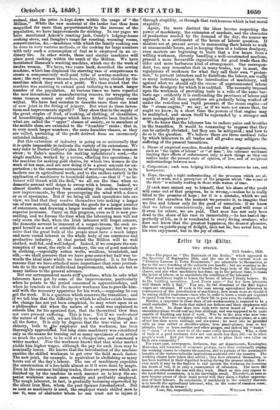Min ta tbr Ellin.
THE IiintrEE.
11th Ockher, 1859. Sin—The paper on "The Rationale of the Strike," which appeared in the Spectator of September 10th, and the one of the current week on "" Country Lessons to Town Economists," are admirable in fhemselves, so -far as the mere touching of the subjects you handle; but are wanting in de- finiteness as to how machinery is to benefit the large body of the labouring classes, and also what machinery has done, up to the present time, to lessen the hours of labour, or to ameliorate the condition of the la'bourer ?
That machinery ought to lessen the hours of labour I firmly believe. So do the building operatives. Lord POWil3 says—" But few farm labourers will thrash with a flail." Tou say, by the dismissal of the tail higher wages are obtained. If such is the case among agricultural labourers in consequence of the introduction of machinery, how much more ao should it be among skilled tradesmen—men who in order to learn a trade ure required to spend from five to seven years of their life to gain even its rudiments. Besides, a carpenter in these days of art-workmanship is required to be a small capitalist. The tools that suited our fathers mid their employers will net do now. In those days iron twill were never heard of. A wooden smoothing-plane would cost say four shillings, and was supposed to be quite capable of finishing any kind of work. Woe be to the man who now ven- tures into a first-rate workshop without an iron smoothing-plane, at a cost of-not less than seven shillings and six-pence ; he must also be provided with an iron rabbet or shoulder-plane, iron panel-planes, iron or box ploughs, iron or braes raortiee and other gauges, and indeed his "basket" or " chest" of tools must be of the same costly description. Why, a chest of tails of a good workman does not cost much less than 501.—to do ether people's work ! And yet these men are not to place their own value on their own commodity ! For years past, newspapers, lecturers, One art departments, Kensington Museums, and museums of economic geology, have been continually urging the working classes to educate themselves, and to partake of the inestimable benefits of the various valuable institutions scattered over the country. The working classes have taken that advice ; they have educated themselves, as has been testified in their dignified bearing during the present strike. How- ever much it may be the fashion to rail against the workman for lessening his hours of toil, it is only a consequence of education. The more the masses are educated the less will they work. Black as this may appear to the hard-fisted economists, it is the inevitable result. Therefore, so sure as men become aware of their brain power will they claim a higher apprecia- tion of their labours. In conclusion, if machinery in the country districts is to benefit the agricultural labourer, why, in the name of common sense, shall it net do so ui towns ?


























 Previous page
Previous page